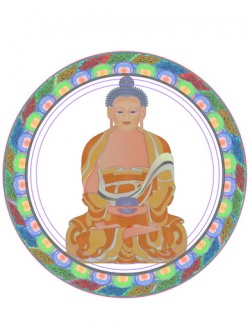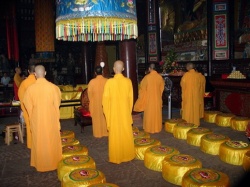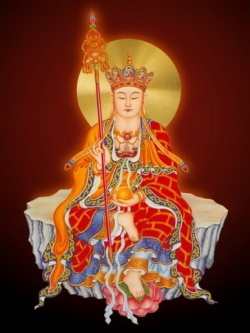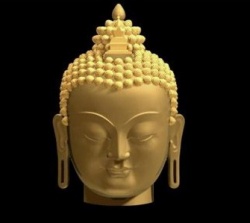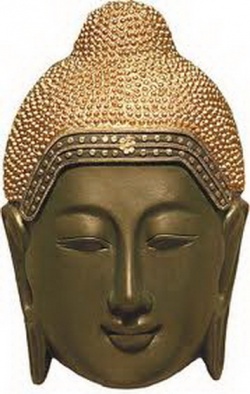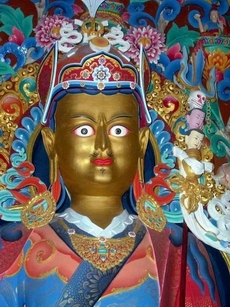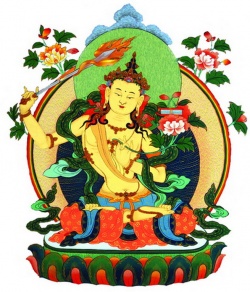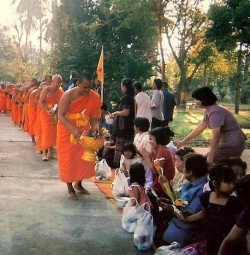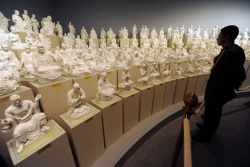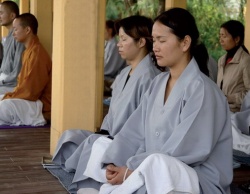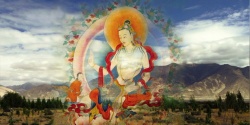Dana
Dāna or Daan (Pāli, Sanskrit: दान dāna) is generosity or giving, a form of alms. In Hinduism and Buddhism, it is the practice of cultivating generosity.
Ultimately, the practice culminates in one of the perfections (pāramitā): the perfection of giving - dāna-pāramitā. This can be characterized by unattached and unconditional generosity, giving and letting go.
Dāna as a formal religious act is directed specifically to a monastic or spiritually-developed person. In Buddhist thought, it has the effect of purifying and transforming the mind of the giver.
Generosity developed through giving leads to being reborn in happy states and the availability of material wealth. Conversely, lack of giving leads to unhappy states and poverty.
Buddhists believe that giving without seeking anything in return leads to greater spiritual wealth. Moreover, it reduces the acquisitive impulses that ultimately lead to continued suffering from egoism.
Types
- Vidya Dāna or Vidya Daan (विद्या दान): Donating/Sharing Knowledge for education.
"Give a man a fish and you feed him for a day.
Teach a man to fish and you feed him for a lifetime."
In Christianity, it is also known as the Gift of Knowledge
- Aushadha Daan : Charity of free medicine to the sick and diseased
- Abhay Daan: Giving freedom from fear
- Kanya Dāna: Giving one's daughter's hand in marriage, where the Daughter goes to stay with her husband.
- Bhu Dāna (भू दान): Donation of land
- Anna Dāna/(अन्ना दान): Donating food to poor and needy, pilgrims, patients at hospitals, orphanages, old age homes etc.,
- Go Dāna: Donation of a Cow
In Hindu Dharmasastras
Broadly following Dāna exist in Hindu culture.
The type and number of Dāna vary depending on occasion such as Thread Ceremony (Vupanayanam - mainly performed for boys of specific castes namely
Brahmins,
Vysyas,
Kshatriyas),
Marriage,
Gruha Pravesam (House Warming ceremony),
Sreemantham (Baby shower),
Birth Ceremony,
Naming Ceremony,
Cradle Ceremony,
Samartha ceremony (for girls when puberty is reached).
Different types of Dāna are given in different quantities and are mixed with other Dāna depending on the occasion.
Sometimes Dāna are given for relieving oneself from the sins committed or attributed or arising out of planetary positions i.e. Dosha nivarana purposes.
Number
Maximum number of Dāna are given away during last rites (rituals performed for Death ceremony).
Ten major Danas or gifts are highlighted in Hindu Dharma, collectively called Dasa Dana.
They are
- Land (Bhu Dāna)
- Gold
- Cow (Go Dāna )
- Clothes (Vastra Dāna)
- Rice
- Oil
- Clarified Butter
- Sesame (Tila Dāna)
- Silver
- Pulses
in Hindu Law
Hindu law breaks the giving and receiving of gifts down by caste, as it does other activities.
Each caste has its own rules and regulations on the topic of religious gifts.
Manu explains that the reason for this is to ensure the protection of all creation, of how things should be.
Brahmins can both receive and give gifts.
Kṣatriyas are allowed only to give gifts, as are the vaiśyas.
Brahmins can accept gifts, but only under the right circumstances and from the right people.
If a brahmin has enough to sustain himself and his family, he is then not to ask for gifts.
If, however, he finds himself in a time of trouble and he anticipates struggling for his maintenance, he may seek gifts from the king.
It is the duty of the king to supply proper livelihood for a brahmin in distress.
Brahmins would not, however, seek gifts from a king that was not of the kṣatriya lineage, nor from any greedy king, or a king who disobeys the śâstras.
Manu makes it clear under his section on Accepting and Giving Gifts that the acceptance of gifts is a special occurrence, and should not be taken for granted.
If a man, a brahmin, becomes accustomed to this, his vedic energy will eventually become extinguished.
Kane elucidates this: “though entitled to accept gifts, a bramana should not again and again resort to that method, since the spiritual power that he acquires by vedic study is lost by accepting gifts.”
It is crucially important to know the law on how to accept a gift, which is why brahmins are the only ones to be able to do so, since they are learned in the Vedas.
It is said that when a man who is not learned accepts certain gifts, he is then reduced to ashes, like a piece of wood.
These certain gifts have the ability to burn up different parts of the ignorant man’s life, such as his land, his sight, his offspring, and his life-force, to name a few.
In this way, an ignorant man should fear any gift, for it has the ability to make him sink "like a cow in the mud".
In the same way, the donor must be wary of who really is learned and worthy of accepting his gifts. It is important also that both the giver and the receiver share the same respect when giving and obtaining gifts.
“When due respect is shown in accepting and in giving a gift, both the receiver and the giver go to heaven; but when the opposite happens, both go to hell.”
Beyond accepting gifts, a man should tirelessly give sacrifices and offerings daily in the spirit of generosity.
If a man gives every day with the right spirit and from his justly earned wealth, he will become boundless.
He is to pick a worthy recipient, a brahmin and give as often as he can to this man. Doing this religiously solidifies hope that one day he will encounter this recipient, who will then save him from all that is.
When it comes to the gifts that are being given, each item brings the donor something to his own life.
For instance, he who gives sesame seeds obtains desirable offspring, he who gives food obtains inexhaustible happiness, he who gives an ox obtains bounteous prosperity, he who gives land obtains land, he who gives a bed obtains a wife, and the list goes on.
The gift of the Veda, which only a brahmin would be able to give, far exceeds any other gift, however.
It is important that the giver is truthful about what he has given or how he has made a gift or sacrifice.
A sacrifice is lost by telling a lie about it.
In the same way, a man must not flaunt his asceticism, for by doing so this too will be lost.
The Nāradasmṛti also touches on the topic of gifts in the Dharmaśāstra, but only briefly.
This smrti takes a different approach from Manu to giving and receiving gifts. It is a more concise advance on the subject.
Here we find that there are specifically four kinds of gifts in legal procedures: what should and should not be given, along with legitimate and illegitimate gifts.
Going further into these stipulations, it says that there exist “eight kinds of things which should not be given, one kind of thing which may be given, seven kinds of legitimate gifts, and sixteen kinds of illegitimate gifts.”
The Nāradasmṛti is easy to read in this way, because it has a funnel effect.
The topic of gifts starts out rather broad with the four classifications of gifts and narrows down into lists of examples of each of the types of these former classifications.
It is said that on the day of commencing penance, the sinner must, among many other things, give dāna (gifts such as gold, cows, etc.) to the brahmanas and feed them.
Earlier in this volume, Kane references other smṛtis (smritis)that write on this same act.
Gold, a cow, a dress, a horse, land, sesamum, clarified butter and food are all gifts that destroy sin.
Also, the gifts of gold, cows, or land can quickly exonerate sins, even those committed in a previous life.
It is understood that gifts are the principle expiations for Hindu men.
Once accepted, a gift is irrevocable.
“What is promised should be given and what has been donated should not be taken back.”
This means that if the donor promised a gift to someone, he must give that gift, or he will become a debtor.
The only time that a gift transaction need not be completed is when the receiver is guilty of irreligious or improper conduct. Otherwise, any gift given cannot be revoked, and any gift promised could result in debt.
The knowledge of gifts in Hindu Law is important because gifts are used also under the topics of varṇa, food, sin and penance, duties of the king, and so on.
Dana is a Pali word which is usually translated as giving or liberality.
It is the practice of generosity - being open hearted. The most common form that this takes is the offering of alms food to the monastic sangha.
A village alms offering
In a tradtional Buddhist country monks and nuns would leave the monastery in the early morning and walk in small, silent groups to the nearest villages.
They would be expected and the local people would come from their houses, in small groups along the way, and stand in a line waiting for the sangha to pass.
As a gesture of respect they would usually remove their sandals.
The exchange would often be in silence although the senior monk might use the oportunity to offer brief teachings or just 'chat' with the people - who would generally be regular visitors to the monastery.
In the West the offering of food usually takes place indoors although the format is not so different as one would encounter either in an Asian monastery or private home.
the alms bowl
The ceremony usually begins with a request by one of the lay people, on behalf of the group, for the Three Refuges and Five Precepts.
There would then be an invitation to the sangha to receive the food.
In relation to the vinaya (rules of discipline - c.f.), as a refinement of the second precept, the monks are not able to freely help themselves - to property in general - and each item must be offered directly into a monk's hand. Fortunately when something is offered to one it is available to all.
When the sangha has the food in their bowls a tradition blessing will be chanted.
During the blessing the lay people will perform the water-pouring ceremony.
well -bless me
Very simply this requires a container for the water and two bowls, one roughly half the size of the other - at least able to fit inside.
The apparatus shown on the left is a traditional form of this but any vessels will do.
During the blessing chants the water is poured into the smaller of the bowls and the quantity of water is such that it overflows the smaller into the larger.
There are several symbolic elements involved here.
The water is a symbol of life, purity and cleansing. As it is poured it represents the 'fluid' nature of generosity, how easy it is for this kindness to pass from one person to another.
As the small bowl overflows into the larger one considers how the positive benefits of any generous act 'overflow' into the lives of many.
When the chanting is finished the water in the bowls can be taken outside and poured onto a tree or plant; again increasing, or expanding the 'field of merits' resulting from the initial act of giving. There are 5 benefits, or blessings, from the practice of generosity everybody will like you.
all your friends will be good people.
you will have a good reputation. you will have lots of self confidence. you will have a heavenly rebirth. (Anguttara V. 34)
As well as dana (generosity) being highly praised as a basic virtue it is a means to balance our greed and selfishness.
It is easy to give away the things that you don't want but giving things of value not only helps the recipient but it also loosens one’s grip in the world of desire.
This is a very important aspect of practice often overlooked.
thanks love
Generosity can be considered in relation to the second of the Four Noble Truths: tanha - desire or craving.
This Truth points to the way we relate to the world through our attachment to certain things.
The things that we grasp or hold on to are the very things that cause us suffering.
The third Noble Truth says that to end the suffering is let go of this desire or craving.
Consider the image of a 'tight-fisted' person.
Relaxed, at ease, happy - these are not words I imagine you would use to describe such a being. However someone who you thought open-handed (or hearted) might warrant such a description.
We all tend to have a degree of meanness and practising giving, relaxing one's grip on, is a way of softening this unpleasant tendency. The greatest gift you can offer anyone is your time.
Some things are easily given but when there is a resistance to give, to let go, this is an indicator of what we are addicted to or obsessed by.
Letting go of material attachments is an active practise which can transform both mental and physical habits and attachments.
Those who gives alms offer a fourfold blessing:
10pixel.gif (124 bytes) The monk bows down to receive an offering.
hey help toward long life
they help toward good appearance
they help toward happiness
they help toward strength.
Therefore long life, good appearance, happiness and strength will also come to the giver, whether amongst heavenly beings or amongst humans. (Anguttara IV. 57)
For correct giving
GIVE:
clean things
what is best
at the proper time
what is suitable
with care
frequently
with a calm mind
with a happy mind
not dirty or soiled items
according to ones means but not of a poor quality
both the giver and receiver should be unhurried
considering the needs of the receiver
the act ought be a gracious and considered one
it takes practice and practice makes perfect
clear about the situation and what one is doing
free from


